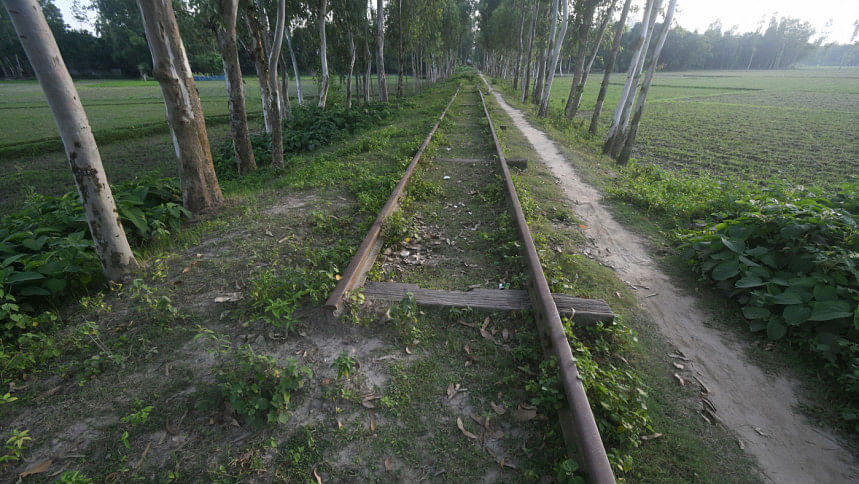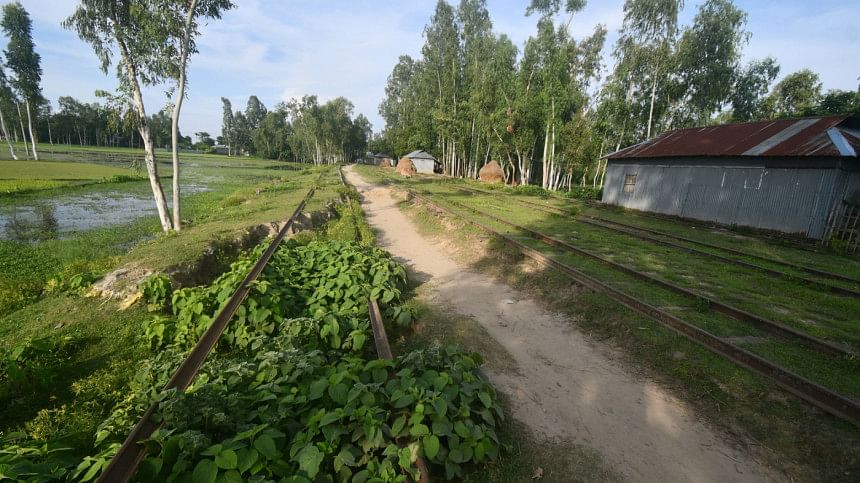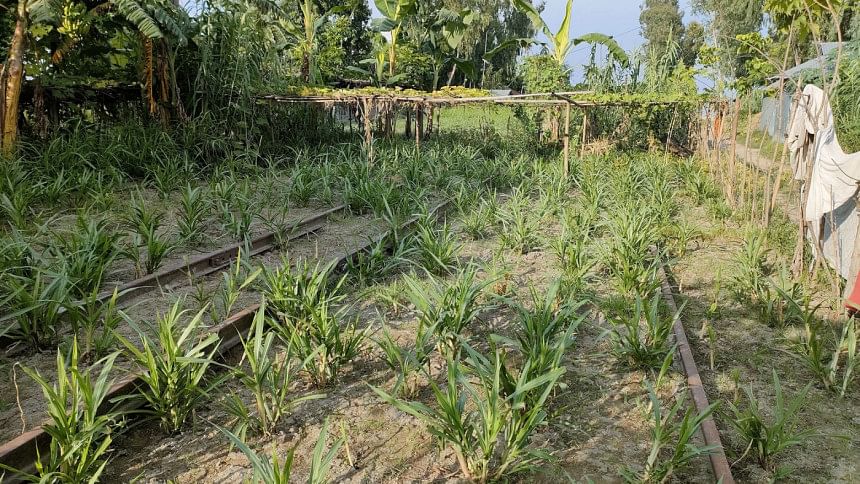Tistamukh-Bahadurabad route: Tracks abandoned, promises unkept

A rail line lies abandoned, where weeds now sprawl. But, behind the eerie landscape lies a deeper narrative -- one of farmers' tears, broken promises and bygone days.
WHEN FERRIES USED TO CARRY TRAIN PASSENGERS
Once upon a time, the Jamuna served as a passage for railway ferries, shuttling train passengers across its waters.
The Tistamukh-Bahadurabad route, initiated by the British government in 1938, witnessed ferries so vast that three train wagons could comfortably fit inside them.
Positioned on one side of the river was the Tistamukh Ghat in Gaibandha's Fulchhari Upazila, while the Bahadurabad Ghat in Jamalpur's Dewanganj Upazila lay on the other.
In 1990, the route transitioned from the Tistamukh Ghat to the Balashi Ghat in the same upazila. To facilitate rail communication in tandem with these railway ferries, the government temporarily requisitioned over 145 acres of land in 1996-97, offering compensation to the 629 farmers of Fulchari upazila.
This land was utilised to construct a nine-kilometre rail link road from Balasighat to Trimohani Bazar.
According to the agreement, Bangladesh Railway was obligated to compensate the farmers as long as the track remained operational, promising to return the land to them once the rail track was inactive.
However, the inauguration of the Jamuna Bridge in 1998 offered an alternate, more preferred means of transportation, rendering the ferry journey challenging, time-consuming, and uncertain due to navigability issues in the river.
What's worse is the farmers who gave up their lands for the construction of the railway line have been left to bear the burden of broken promises. The railway authorities have ceased compensating them for the last 13 years, they alleged.
Consequently, passenger ferry services ceased entirely in 2005, making the nine-km rail route redundant.
In 2015, even ferries carrying goods-laden wagons to the rail line halted entirely due to navigability challenges, resulting in a complete suspension of all types of train communication.

'WHERE IS OUR COMPESATION?'
In a recent visit, the correspondent observed that the tracks lie dormant, engulfed by encroaching houses, weeds, and makeshift mud-roads. Public properties have suffered extensive damage, with stolen stones and severed tracks becoming a common sight, yet indifference prevails, and the situation remains unaddressed.
What's worse is the farmers who gave up their lands for the construction of the railway line have been left to bear the burden of broken promises. The railway authorities have ceased compensating them for the last 13 years, they alleged.
Many farmers, like 67-year-old Sadekur Rahman from Kanchipara village have given up 53 decimals of their agricultural land without adequate compensation.
Despite receiving some payments initially, they have been deprived of any further financial assistance since 2010, leaving them with unresolved complexities, they added.
Momena Akhter, Sadekur's wife, said, "After receiving around Tk. 92,000 during the railway line construction, we were promised continuous compensation. However, for the past decade, we haven't received a single penny."
The story is no different for Abdur Rauf, an elderly farmer from Madhya Kanchipara, who lamented the loss of his 60-decimal land for the rail line construction. His hope of cultivating paddy or leasing the land to secure a better life in his old age has been shattered.
"It has been 14-15 years since I got the last payment of compensation," he said.
Almost all the farmers this correspondent talked to shared similar stories, with some of them even claiming that they had not received any compensation since 2003-4.

AUTHORITIES' TAKE
According to Gaibandha district administration, railway authorities disbursed approximately Tk 4 crore to 629 farmers between the years 1996-97 and 2010 (Bangla 1417). Subsequently, an estimated sum of Tk 1.48 crore was earmarked for compensations for Bangla year 1417, 1418, and 1419.
However, since then, no payments have been made by the railway authorities. The landowners are owed approximately Tk 6 crore from Bangla years 1417 to 1430 (2010 to 2023).
Sources within Gaibandha land office echoed the same.
Contacted, Md Asadul Hauqe, chief engineer of Bangladesh Railway (west zone, Rajshahi), said, "We have no plan to reopen the railway line from Balasighat to Trimohani. The compensation money would be given for as long as the track was operational."
Divisional Engineer Md Ahsan Habib, Lalmonirhat, said, "Compensations of Bangla years 1417, 1418, and 1419 were estimated and sent to us by the local district administration. But for some unforeseen reasons that payment could not be made. Currently, we are working on the payment of those compensations to the landowners."
"Since the railway line was operational till 2015, we will pay compensations to the landowners till 2015. After that, we will remove all rail tracks and temporary bridges, and the farmers will be given back their land," he added,
Contacted, Gaibandha Additional Deputy Commissioner (Revenue) Md Jahid Hasan Siddiquee said, "We are in touch with the railway authorities. They have been informed in writing about the farmers' due compensations. The railway authorities are also interested. We have asked them to remove the railway line so that we can return the land to the farmers."

 For all latest news, follow The Daily Star's Google News channel.
For all latest news, follow The Daily Star's Google News channel. 







Comments